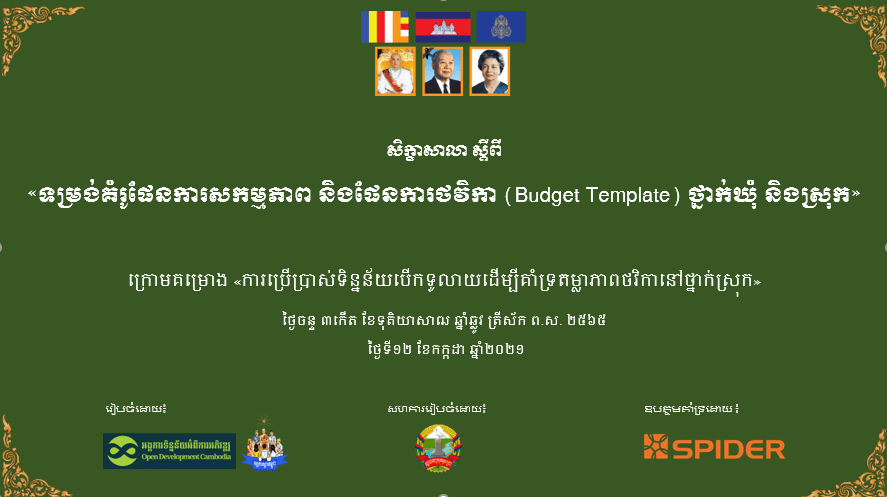Virtual workshop on commune/sangkat citizen budget template to commune and district officials in Ou Chrov and Malai district
In collaboration with STAR Kampuchea, Open Development Cambodia (ODC) conducted and facilitated a virtual workshop on commune/sangkat citizen budget template to commune and district officials in Ou Chrov and Malai district in the morning of the 12th and 14th of July, 2021 respectively. This workshop is conducted under the ODC project “Using Open Data to Support Budget Transparency at District Level” funded by the Swedish Program for ICT in Developing Regions (SPIDER) via Zoom online platform. Experts from the Department of District and Commune Affairs of the Ministry of Interior presented and trained on the new budget template. Relevant stakeholders and participants from district and commune levels have joined the training including the deputy governors, the chiefs of district administration, deputy chiefs, commune chiefs, commune clerks, and assistants. The main objective of this joint virtual workshop is to enhance understanding of responsibilities and accountabilities of commune/sangkat council and administration on the process of action implementation by using the action plan and budget template. The sub-national level administrations also instructed how to fill in the newly implemented action plan and budget template of the Ministry of Interior to disseminate budget information to the locals further.
The workshop on commune and district budget templates for Ou Chrov and Malai district officials starts with the opening remark of Mrs. Chet Charya, executive director of STAR Kampuchea, and Mr. Thy Try, ODC executive director. During her opening remark, Mrs. Chet Charya has introduced all the participants and stressed the importance of transparency in budget information in public service delivery for the local citizens. Mr. Thy Try has also added that the new commune/sangkat citizen budget template is crucial for the commune/sangkat administration to acknowledge. The budget template can simplify budget information that allows it to be understandable by the locals and make it easier for the sub-national level administration to disseminate the information to the public. ODC under “Using Open Data to Support Budget Transparency at District Level” has been actively collecting budget information of Ou Chrov and Malai district, compile it, and make it accessible for the public on their website, he continued. After that, a representative from the Ministry of Interior, Mr. Nhav Tang presented on the responsibilities of the commune administration. This session readdressed all participants the duties, functions, and power of all relevant stakeholders at the sub-national level administration. He also emphasized decentralization and deconcentration processes that require commune administration participation.
The next session starts after a 10-minute break by Mr. Thorn Piseth, chief of municipal, district, commune/sangkat finance office. His session is “Citizen participation in commune and district budget formulation and adoption”. During his presentation, he underlines the process of the annual performance of the budget plan by the commune/sangkat administration. Firstly, the city/provincial administration publishes a notification on the yearly budget analysis of commune/sangkat administration. Commune/sangkat planning and budgeting committee propose a meeting on the process of implementation and budget planning for next year. The commune clerk will then draft commune/sangkat annual budget summary using commune/sangkat budget summary templates. Mr. Thorn Piseth also added that the information that fills in the template needs to reflect the three-year investment rolling plan, budget planning services, and all budget-related documents, including details on revenue and expenditure, development, and administration spending. The budget information will be made accessible at the public place such as the information board at the commune hall, school, pagoda, and health center two weeks before the commune’s budget plan consultant meeting takes place. The citizens will be allowed to discuss the budget plan at the commune hall. Commune chiefs are responsible for encouraging and inviting local citizens, non-governmental organizations, the private sector, and communities to join the consultation meeting. After being finalized and verified by the city/provincial governor, the commune/sangkat budget plan summary will be publicly posted.

Mr. Nhav Tang, a representative from the Ministry of Interior, is presenting his session “Responsibilities of the commune administration”.
At the end of the workshop, the discussion session was very engaging and fruitful. Participants have expressed their perspective toward the training as very significant and practical. The workshop provides clear guidelines on the responsibilities of services providers, citizens’ participation, and the process of the commune/sangkat citizen budget template completion. One trainer stated that “After the Ministry of Interior issued a Guideline on Citizen Participation in Commune/Sangkat Budget Formulation and Adoption, this workshop is the first of its kind that representatives from the Ministry of Interior have participated as a trainer to disseminate knowledge to operators and practitioners at the sub-national administration to understand the procedures for completing the commune/sangkat citizen budget template.”



